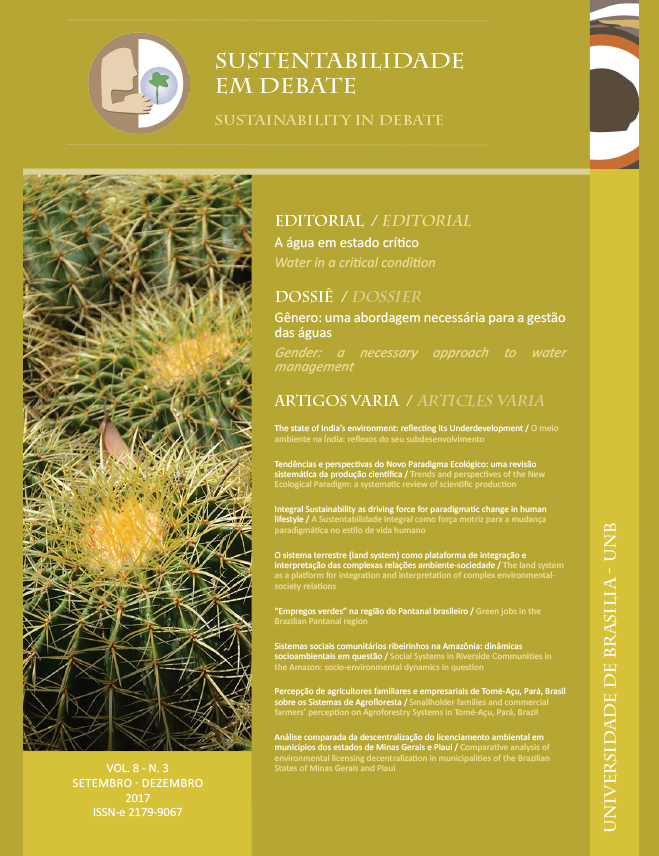Tendências e perspectivas do Novo Paradigma Ecológico:
uma revisão sistemática da produção científica
DOI :
https://doi.org/10.18472/SustDeb.v8n3.2017.24656Mots-clés :
Escala NEP, Consciência ambiental, Sustentabilidade, Revisão Sistemática, Meta-análiseRésumé
A escala New Ecological Paradigm (NEP) foi desenvolvida para facilitar a compreensão de como a sociedade vê as questões ambientais, avaliando suas atitudes, crenças e comportamentos em relação ao meio ambiente. Nesse sentido, o objetivo deste artigo é analisar a produção científica sobre o Novo Paradigma Ecológico (NEP), identificando tendências e perspectivas referentes à sua aplicação. Para isso, realizou-se uma análise sistemática da literatura científica, com alguns indicadores bibliométricos, conduzida pela metodologia Prisma. Por meio da aplicação dessa metodologia, foram selecionados 59 artigos para análise desse estudo. Percebeu-se que o principal público da aplicação dessa escala são estudantes universitários, com predominância do sexo feminino e que 85% dos artigos revelaram uma visão ecocêntrica de mundo, refletindo em um alto nível de consciência ambiental. Dessa forma, a análise sistemática dos artigos revela que as pessoas estão adotando o Novo Paradigma Ecológico com comportamentos e atitudes pró-ambientais, contribuindo para o desenvolvimento sustentável.
Références
ALVES, N. B. A consciência ambiental dos jovens: uma pesquisa com estudantes de nível médio técnico e superior tecnológico. Dissertação de Mestrado. Programa de Pós-Graduação em Administração. Escola de Administração, Universidade Federal do Rio Grande do Sul, 2013.
ARAÚJO, C. A. Bibliometria: evolução histórica e questões atuais. Revista em Questão, Porto Alegre, v. 12, n. 1, p. 11-13, 2006.
COLBY, M. E. Environmental Management in Development: the evolution of paradigms. Ecological Economics, v. 3, p. 193-213, 1991.
DUNLAP, R. E.; VAN LIERE, K. D. The “new environmental paradigm”: a proposed measuring instruments and preliminary results. The Journal of Environmental Education, v. 9, p. 10-19, 1978.
DUNLAP, R. E. et al. Measuring Endorsment of the New Ecological Paradigm: a revised NEP Scale. Journal of Social Issues, v. 56, n. 3, p. 424-442, 2000.
HALKOS, G.; MATSIORI, S. Environmental attitude, motivations and values for marine biodiversity protection. Journal of Behavioral and Experimental Economics, v. 69, p. 61-70, 2017.
HODGKINSON, S.; INNES, J. The prediction of ecological and environmental belief systems: the differential contributions of social conservatism and beliefs about money. Journal of Environmental Psychology, v. 20, p. 285-294, 2000.
IZADPANAHI, P.; ELKADI, H. TUCKER, R. Greenhouse affect: the relationship between the sustainable design of schools and children’s environmental attitudes. Environmental Education Research, v. 23, n. 7, p. 901-918, 2017.
MIKHAILOVA, I. Sustentabilidade: evolução dos conceitos teóricos e os problemas da mensuração prática. Revista Economia e Desenvolvimento, n. 16, p. 22-41, 2004.
MILBRATH, L. W. Envisioning a sustainable society: learning our way out. SUNY series in environmental public policy, 1989.
MOHER, D. et al. Principais itens para relatar revisões sistemáticas e meta-análises: a recomendação Prisma. Epidemiologia e Serviços de Saúde, v. 24, n. 2, abr./jun., 2015.
NASCIMENTO, L. F. M. do. Gestão ambiental e sustentabilidade. Universidade Aberta do Brasil, 2008.
SENADO. Conferência Rio-92 sobre o meio ambiente do planeta: desenvolvimento sustentável dos países. Disponível em: <http://www.senado.gov.br/noticias/Jornal/emdiscussao/rio20/a-rio20/conferencia-rio-92-sobre-o-meio-ambiente-do-planeta-desenvolvimento-sustentavel-dos-paises.aspx>. Acesso em: 19 out. 2016.
SOARES, B. E. C.; NAVARRO, M. A.; FERREIRA, A. P. Desenvolvimento sustentado e consciência ambiental: natureza, sociedade e racionalidade. Ciências & Cognição, v. 02, p. 42-49, 2004.
SUDBURY-RILEY, L.; HOFMEISTER-TOTH, A.; KOHLBACHER, F. A cross-national study of the ecological worldview of senior consumers. International Journal of Consumer Studies, v. 38, p. 500-509, 2014.
XIAO, C.; HONG, D. Gender differences in concerns for the environment among the Chinese public: an update. Society and Natural Resources, v. 30, n. 6, p. 782-788, 2017.
Téléchargements
Publié
Numéro
Rubrique
Licence
SUSTAINABILITY IN DEBATE – Copyright Statement
The submission of original scientific work(s) by the authors, as the copyright holders of the text(s) sent to the journal, under the terms of Law 9.610/98, implies in the concession of copyrights of printed and/or digital publication to the Sustainability in Debate Journal of the article(s) approved for publication purposes, in a single issue of the journal. Furthermore, approved scientific work(s) will be released without any charge, or any kind of copyright reimbursement, through the journal’s website, for reading, printing and/or downloading of the text file, from the date of acceptance for publication purposes. Therefore, the authors, when submitting the article (s) to the journal, and gratuitous assignment of copyrights related to the submitted scientific work, are fully aware that they will not be remunerated for the publication of the article(s) in the journal.
The Sustainability in Debate Journal is licensed under Creative Commons License – Non-Commercial-No-Derivation Attribution (Derivative Work Ban) 3.0 Brazil, aiming at dissemination of scientific knowledge, as indicated on the journal's website, which allows the text to be shared, and be recognized in regards to its authorship and original publication in this journal.
Authors are allowed to sign additional contracts separately, for non-exclusive distribution of the works published in the Sustainability in Debate Journal (for example, in a book chapter), provided that it is expressed the texts were originally published in this journal. Authors are allowed and encouraged to publish and distribute their text online, following publication in Sustainability in Debate (e.g. in institutional repositories or their personal pages). The authors expressly agree to the terms of this Copyright Statement, which will be applied following the submission and publishing by this journal.









